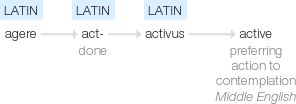Active
Middle English (in the sense ‘preferring action to contemplation’): from Latin activus, from act- ‘done’, from the verb agere .
wiktionary
From Middle English actyf, from Old French actif, from Latin activus, from agere(“to do, to act”), ultimately from Proto-Indo-European *h₂éǵeti.
Morphologically act + -ive.
etymonline
active (adj.)
mid-14c., "given to worldly activity" (opposed to contemplative or monastic), from Old French actif (12c.) and directly from Latin activus, from actus "a doing" (from PIE root *ag- "to drive, draw out or forth, move").
As "capable of acting" (opposed to passive), from late 14c. Meaning "energetic, lively" is from 1590s; that of "working, effective, in operation" (opposed to inactive) is from 1640s. Active voice is recorded from 1765; grammatical use of active, signifying performance and not endurance of an action, dates from mid-15c. (opposed to passive or reflexive).
